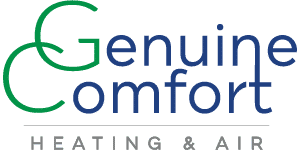Did you know that the average American spends around 90 percent of their time indoors? With the rise of remote work, more and more people are spending the majority of their waking hours not just indoors, but at home, making indoor air quality more important than ever.
At Genuine Comfort, we recognize that creating a comfortable home environment is about so much more than just controlling the temperature — it’s also about improving indoor air quality, which can affect your health, comfort, and overall well-being.
In this blog post, we’ll explore the importance of indoor air quality, key factors that affect it, and solutions for improving your home’s air quality.
The Importance of Indoor Air Quality
Every day, we interact with numerous environments. We drive our cars on busy roads, go to work, shop for groceries, and participate in recreational activities. With pollution, allergens, and unknown contaminants everywhere, it’s important to be able to come home each day and know you’re breathing in clean and safe air.
Poor indoor air quality can have numerous health implications, from allergies to respiratory issues to long-term health problems. The risk of issues is even higher for those who have existing health concerns. That’s why it’s so important to ensure your home is a retreat from the outside world and create an environment that’s as clean and healthy as possible.
Key Factors That Affect Indoor Air Quality
Now that you’re aware of the importance of indoor air quality, let’s take a closer look at some of the factors that can influence it.
Humidity Levels
The humidity level in your home largely depends on the climate you live in. Desert environments typically have very little water in the air, while tropical areas are much more humid. The ideal home humidity level is between 30 and 50 percent, according to the Environmental Protection Agency.
Some environments will naturally fall into this range, while others may need some help. If you live in a dry climate, you can use a humidifier to prevent skin irritation and respiratory discomfort. If you live in a tropical or coastal area, invest in a dehumidifier to avoid mold growth, protect your air ducts, and alleviate that uncomfortable sticky feeling that comes with high humidity.
Airborne Pathogens
Thanks to the lingering impact of COVID-19, it’s more important than ever to eliminate airborne pathogens, including viruses, bacteria, fungi, and mold spores. Air purification systems are an effective tool for eliminating these airborne pathogens, as well as allergens like dust, pet dander, and pollen. With an air purification system, you can rest assured that the air you breathe at home is healthy and safe.
VOCs
Volatile organic compounds, commonly referred to as VOCs, are chemicals found in all kinds of household products, from furniture to paint to cleaners. They offgas at a high rate, affecting indoor air quality and impacting the overall health of building occupants. Whenever possible, choose low- or zero-VOC products to protect your family’s health.
Carbon Monoxide
Carbon monoxide (CO) is a colorless, odorless gas produced by many household items, including engines, space heaters, furnaces, portable generators, fireplaces, and more. In large amounts, it can cause major health issues and even death, but even in small amounts, it can still lead to headaches, dizziness, nausea, weakness, and confusion.
Solutions for Improving Indoor Air Quality
Fortunately, there are many ways to improve indoor air quality. Here are our expert recommendations:
- Invest in an air purifier: We recommend the Reme Halo, an in-duct air purifier that uses ionization and airborne hydrogen peroxide to reduce bacteria, viruses, dust, mold spores, dander, and pollen.
- Maintain proper humidity levels: Adding a humidifier or dehumidifier to your home ensures the right amount of water in the air.
- Avoid VOCs: Whenever possible, opt for low- or zero-VOC products, especially when it comes to paint and cleaning supplies.
- Get a carbon monoxide detector: Most carbon monoxide detectors alert you when the CO concentration gets above 80 ppm, but it can be dangerous even at lower levels. We recommend detectors with digital screens that allow you to continuously monitor CO concentration.
- Regular HVAC maintenance: Cleaning ducts, replacing air filters, and ensuring system efficiency are essential for protecting indoor air quality.
Indoor Air Quality Solutions from Genuine Comfort
At Genuine Comfort, we believe that improving indoor air quality is an investment in your family’s health and well-being. If you’re seeking ways to ensure the air you breathe at home is safe and healthy, you’re in the right place. We would be honored to provide the quality HVAC solutions you deserve. Contact us today to get started!




Follow Us